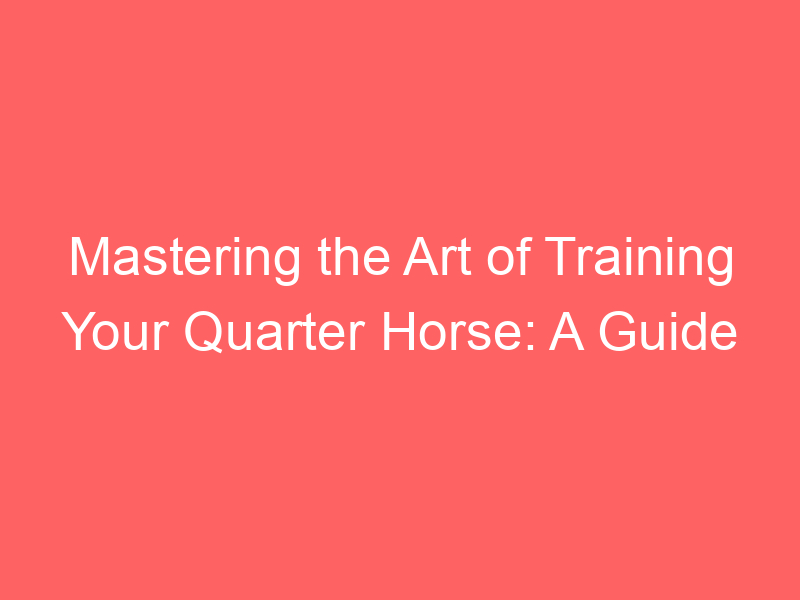
Introduction to Quarter Horse Care
Whether you’re a seasoned equestrian or a newcomer to the world of horses, understanding the basics of horse care is crucial. This is particularly true when it comes to Quarter Horses, a breed known for their versatility and friendly nature. In this section, we’ll delve into the essentials of horse care and the specific needs of Quarter Horses.
- Understanding the Basics of Horse Care
- Specific Needs of Quarter Horses
Before we dive into the specifics of Quarter Horse care, it’s important to understand the basics of horse care. All horses, regardless of breed, require a balanced diet, regular exercise, and routine health checks. They also need a safe and clean environment to live in. A horse’s diet should consist of hay or grass, grains, and plenty of fresh water. Regular exercise is crucial for a horse’s physical and mental health, and routine health checks can help catch any potential issues early on.
While the basics of horse care apply to all breeds, Quarter Horses have some specific needs. Known for their muscular build and high energy levels, Quarter Horses require a diet rich in protein and carbohydrates. They also benefit from regular, vigorous exercise to keep them fit and healthy. Additionally, due to their compact bodies and heavy musculature, Quarter Horses are prone to certain health issues, such as lameness and obesity. Therefore, regular vet checks and a well-managed diet are crucial for this breed.
Understanding and meeting the specific needs of your Quarter Horse is key to ensuring their health and happiness. In the following sections, we’ll delve deeper into the world of Quarter Horse ownership, from what to expect as a new owner to training tips and more.
New Quarter Horse Owners: What to Expect
As a new owner of a Quarter Horse, you might be excited and a bit nervous. That’s completely normal! This section will help you understand what to expect in the first few days and common challenges you might face. Let’s dive in!
- First few days with your Quarter Horse
- Common challenges for new owners
During the first few days, your Quarter Horse might be a little nervous. This is because they’re in a new environment. It’s important to give them time to adjust. Spend time with your horse, talk to them gently, and let them get used to your presence. Remember, patience is key!
Make sure they have plenty of fresh water and hay. A balanced diet is essential for their health. Also, ensure they have a clean and comfortable place to rest.
It’s also a good idea to introduce them to any other horses or animals on your property slowly. This can help prevent any conflicts or stress.
As a new owner, you might face a few challenges. One common issue is understanding your horse’s behavior. Horses communicate through body language, so it’s important to learn what different behaviors mean. For example, if your horse is swishing its tail a lot, it might be irritated.
Another challenge can be maintaining your horse’s health. Regular vet check-ups are essential, as is keeping up with vaccinations and deworming. It’s also important to keep an eye out for any signs of illness or injury.
Finally, training your horse can be a challenge. It’s important to be patient and consistent. Remember, every horse learns at its own pace. Don’t rush the process.
In conclusion, owning a Quarter Horse can be a rewarding experience. It might be a bit challenging at first, but with patience and dedication, you’ll build a strong bond with your new companion. Happy horse owning!
Quarter Horse Training Tips
Training a Quarter Horse can be a rewarding experience. These horses are known for their agility, speed, and adaptability, making them perfect for various equestrian activities. However, proper training is essential to bring out the best in these magnificent creatures. In this section, we will explore some basic training principles and specific techniques that are effective for Quarter Horses.
-
Basic Training Principles
Before diving into the specific techniques for Quarter Horses, it’s crucial to understand some basic training principles. These principles apply to all horse breeds and form the foundation of any successful training program.
- Consistency: Horses learn through repetition. Consistency in your commands, rewards, and consequences will help your horse understand what you expect from them.
- Patience: Training takes time. Don’t rush the process. Allow your horse to learn at their own pace.
- Positive Reinforcement: Rewarding good behavior is more effective than punishing bad behavior. Use treats, praises, or petting as rewards.
- Respect: Horses are intelligent creatures. Treat them with respect and kindness, and they will respond in kind.
-
Specific Training Techniques for Quarter Horses
Now that we’ve covered the basic principles, let’s look at some specific techniques that work well with Quarter Horses. These techniques take advantage of the breed’s natural abilities and characteristics.
- Groundwork: Quarter Horses are agile and quick. Groundwork exercises that focus on these traits can help improve their responsiveness and control.
- Speed Control: These horses are known for their speed. Training them to control their speed can enhance their performance in various equestrian events.
- Desensitization: Quarter Horses are generally calm and steady. Desensitization training can help them stay calm in different environments and situations.
- Trail Riding: This breed is versatile and adaptable. Trail riding can help them become more confident and comfortable in various terrains and situations.
Remember, every horse is unique. What works for one might not work for another. Always be patient, consistent, and respectful, and you’ll find the training process to be a rewarding experience for both you and your Quarter Horse.
Embracing the Horse Riding Lifestyle
For many, horse riding is more than a hobby; it’s a lifestyle. It’s a bond between human and animal, a way to connect with nature, and a form of exercise that’s both challenging and rewarding. Whether you’re a seasoned rider or a beginner, embracing the equestrian lifestyle can bring a sense of fulfillment and joy.
Equestrian Tips for Beginners
Starting your journey into the world of horse riding can be exciting, but it can also be a bit overwhelming. Here are a few tips to help you get started:
- Getting comfortable in the saddle
- Building a bond with your horse
One of the first steps in horse riding is learning how to sit properly in the saddle. This is not just about comfort; it’s also about safety and control. Start by sitting up straight with your shoulders back. Your feet should be flat in the stirrups, and your knees should be slightly bent. Practice this posture until it feels natural and comfortable.
Building a bond with your horse is crucial for a successful riding experience. Spend time with your horse outside of riding sessions. Feed them, groom them, and learn their behaviors. This will help you understand their needs and create a strong bond of trust and respect.
Embracing the horse riding lifestyle is a journey that requires patience, dedication, and a love for these magnificent creatures. But with time and practice, you’ll find that it’s a journey well worth taking.
Horse Ownership Guide: Quarter Horse Edition
Whether you’re a seasoned equestrian or a newcomer to the world of horse ownership, this guide is designed to help you navigate the unique challenges and rewards of owning a Quarter Horse. Let’s dive in!
- Choosing the Right Quarter Horse
Choosing the right Quarter Horse is the first step towards a rewarding horse ownership experience. Quarter Horses are known for their versatility, speed, and calm disposition, making them a popular choice for both competitive and recreational riders.
When selecting a Quarter Horse, consider the following factors:
- Temperament: Look for a horse that is calm, responsive, and easy to handle. A good Quarter Horse should be eager to please and quick to learn.
- Health: A healthy horse is a happy horse. Check for clear eyes, a shiny coat, and a strong, steady gait.
- Age and Experience: Consider your own riding skills and experience. A young, inexperienced horse may be a challenge for a novice rider, while an older, more experienced horse could be a perfect match.
- Understanding the Costs of Ownership
Before you bring your new Quarter Horse home, it’s important to understand the costs associated with horse ownership. These can include:
- Initial Purchase: The cost of a Quarter Horse can vary widely, depending on factors such as age, pedigree, and training.
- Boarding: Unless you have your own stable, you’ll need to pay for boarding. This can range from $200 to $500 per month.
- Food and Water: Expect to spend around $50 to $100 per month on hay, grain, and water.
- Veterinary Care: Routine vet care can cost around $300 per year, but emergency care can be much more expensive.
- Equipment: You’ll also need to invest in tack (saddle, bridle, etc.), grooming supplies, and riding gear.
Remember, owning a horse is a long-term commitment. Make sure you’re prepared for the financial responsibility before you take the plunge.
Quarter Horse Maintenance: A Comprehensive Guide
Proper care and maintenance are crucial to ensure your Quarter Horse lives a healthy and happy life. This guide will provide you with essential tips on daily grooming routines and feeding and nutrition.
Horse Care Tips
-
Daily Grooming Routines
Grooming your Quarter Horse daily is not just about keeping them looking good, but it’s also about their health. A good grooming routine includes brushing their coat, cleaning their hooves, and checking for any signs of injury or illness.
Start by using a curry comb to remove any loose hair or dirt from their coat. Follow this with a body brush to give their coat a nice shine. Don’t forget to clean their hooves with a hoof pick, checking for any stones or debris that might have gotten lodged in there. Lastly, check their eyes, ears, and mouth for any signs of infection.
-
Feeding and Nutrition
Feeding your Quarter Horse properly is crucial for their health and performance. A balanced diet for a Quarter Horse typically includes hay, grains, and plenty of fresh water.
Hay should make up the bulk of their diet, as it’s a good source of fiber. Grains like oats, corn, and barley can be added to provide extra energy. However, grains should be fed in moderation as too much can lead to health problems. Always ensure your horse has access to clean, fresh water.
Remember, each horse is unique and may have different dietary needs. It’s always a good idea to consult with a vet or a horse nutritionist to create a feeding plan that suits your horse’s specific needs.
In conclusion, taking care of a Quarter Horse involves daily grooming and providing a balanced diet. By following these tips, you can ensure your horse stays healthy and happy.
The Equestrian Lifestyle: More Than Just Riding
When people think of the equestrian lifestyle, they often picture a person on horseback, galloping through a field or jumping over obstacles. However, being an equestrian is about so much more than just riding. It’s about community involvement, attending equestrian sports and events, and embracing a lifestyle that revolves around these magnificent creatures. Let’s dive deeper into these aspects.
- Community Involvement
Being part of the equestrian community means more than just owning a horse. It’s about being part of a group of like-minded individuals who share a passion for horses. This can involve participating in local horse clubs, volunteering at horse rescue organizations, or even organizing community events like horse shows or charity rides. The equestrian community is a tight-knit group, and being involved can provide a sense of belonging and camaraderie.
- Equestrian Sports and Events
Equestrian sports and events are a big part of the horse-riding lifestyle. These can range from local horse shows and competitions to international events like the Olympics. Participating in or even just watching these events can be a thrilling experience. It’s a chance to see skilled riders and their horses in action, learn new techniques, and be inspired by the incredible bond between horse and rider.
Whether you’re a competitive rider or just enjoy watching, equestrian sports and events offer a way to connect with the broader equestrian community and celebrate the beauty and power of horses.
In conclusion, the equestrian lifestyle is about more than just riding. It’s about being part of a community, participating in events, and sharing a deep love for horses. Whether you’re a seasoned rider or just starting out, there’s a place for you in the equestrian world.
Quarter Horse Breeding Tips
Quarter Horse breeding is a complex yet rewarding process. With the right knowledge and preparation, you can successfully breed your Quarter Horse. This section will provide you with essential tips on understanding Quarter Horse genetics and choosing the right mate for your horse.
- Understanding Quarter Horse Genetics
The first step in successful Quarter Horse breeding is understanding the horse’s genetics. Quarter Horses are known for their speed, agility, and muscular build. These traits are largely determined by their genetics.
Genetics play a crucial role in determining the physical and behavioral traits of the offspring. For instance, if both parent horses are fast runners, there is a high probability that their offspring will also be a fast runner. Similarly, if one parent horse has a calm temperament, the offspring may inherit this trait.
It’s also important to note that some genetic traits can lead to health issues. Therefore, it’s crucial to have a thorough understanding of your horse’s genetic history before breeding.
- Choosing the Right Mate for Your Horse
Choosing the right mate for your Quarter Horse is another critical aspect of successful breeding. The mate should complement your horse’s traits and help to produce a healthy and strong offspring.
When choosing a mate, consider factors such as the horse’s health, temperament, and physical traits. A healthy horse with a good temperament and strong physical traits is generally a good choice for breeding.
It’s also important to consider the horse’s genetic history. A horse with a history of health issues may pass these issues onto the offspring. Therefore, it’s crucial to choose a mate with a clean genetic history.
In conclusion, successful Quarter Horse breeding requires a thorough understanding of genetics and careful mate selection. By following these tips, you can increase your chances of producing a healthy and strong offspring.
Conclusion: Embracing the Quarter Horse Life
As we wrap up our comprehensive guide on Quarter Horses, let’s take a moment to review the key points we’ve discussed and look forward to the exciting journey that lies ahead.
- Recap of essential tips for newbies
- Encouragement for the journey ahead
Firstly, remember that owning a Quarter Horse is a commitment that requires time, effort, and resources. From understanding their unique needs in terms of care and maintenance, to learning effective training techniques, every step is crucial in ensuring your horse’s well-being.
Embrace the equestrian lifestyle fully – it’s not just about riding, but also about building a bond with your horse. Breeding Quarter Horses can be a rewarding experience, but it’s important to do so responsibly and with the right knowledge.
The journey of owning a Quarter Horse is filled with challenges, but also immense joy and fulfillment. As you embark on this adventure, remember that every horse is unique and requires patience and understanding.
Whether you’re a seasoned equestrian or a newbie, there’s always something new to learn in the world of Quarter Horses. So keep an open mind, stay committed, and most importantly, enjoy the ride!
As the famous saying goes, “The essential joy of being with horses is that it brings us in contact with the rare elements of grace, beauty, spirit, and freedom.” Embrace the Quarter Horse life and experience this joy for yourself.






